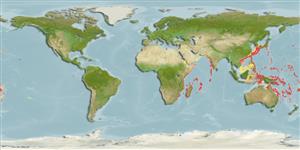Teleostei (teleosts) >
Beryciformes (Sawbellies) >
Berycidae (Alfonsinos)
Etymology: Beryx: Greek, beryx or berys = a name of a fish. Cuvier & Valenciennes (1829:221) precise that the name was used by Gesner from Varinus, but with no indication whatsoever helping identifying any species. After D'Arcy Wentworth Thompson (A glossary of Greek fishes, 1947), the name actually seems to come originally from Hesychius, but perhaps the name was not originally a fish name. Thompson compares it to meryx (ruminant), applied on skaros (Scarus), so it may have been applied on a parrot fish referring to its browsing/grazing behavior described by Aristoteles and followers.
Environment: milieu / climate zone / depth range / distribution range
Ecology
Marine; benthopelagic; depth range 100 - 500 m (Ref. 42565). Deep-water
Northwest Pacific: Japan. Also known from the Western Indian Ocean.
Size / Weight / Age
Maturity: Lm ? range ? - ? cm
Max length : 30.0 cm SL male/unsexed; (Ref. 42565)
Life cycle and mating behavior
Maturity | Reproduction | Spawning | Eggs | Fecundity | Larvae
Hayashi, M., 2002. Berycidae. p. 485-486. In T. Nakabo (ed.). Fishes of Japan with pictorial keys to the species (second edition). Tokai University Press, 1749 p. (Ref. 42565)
IUCN Red List Status (Ref. 130435: Version 2024-1)
Threat to humans
Harmless
Human uses
Tools
Special reports
Download XML
Internet sources
Estimates based on models
Preferred temperature (Ref.
123201): 12.6 - 21.3, mean 16.2 °C (based on 189 cells).
Phylogenetic diversity index (Ref.
82804): PD
50 = 0.6260 [Uniqueness, from 0.5 = low to 2.0 = high].
Bayesian length-weight: a=0.01122 (0.00514 - 0.02450), b=3.04 (2.87 - 3.21), in cm total length, based on all LWR estimates for this body shape (Ref.
93245).
Trophic level (Ref.
69278): 3.9 ±0.5 se; based on size and trophs of closest relatives
Resilience (Ref.
120179): Low, minimum population doubling time 4.5 - 14 years (Preliminary K or Fecundity.).
Fishing Vulnerability (Ref.
59153): Low to moderate vulnerability (27 of 100).
